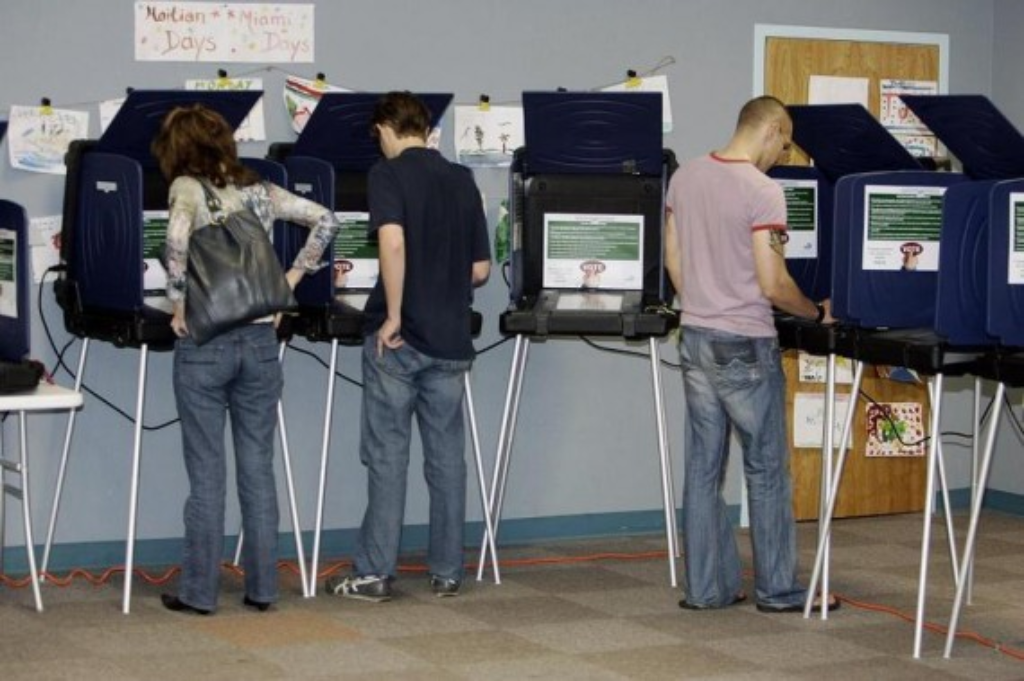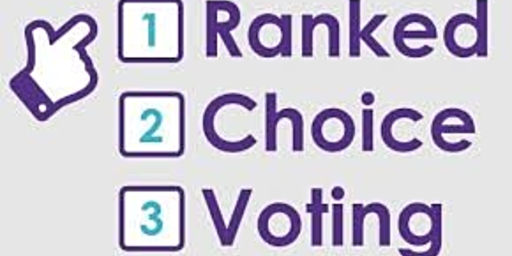Maine Voters Head To The Polls To Give Ranked-Choice Voting A Try
Maine voters head to the polls today to pick nominees for Governor and several other offices, but the most interesting thing is way they'll be voting.

There are primaries in several states today, including races in Virginia and North Dakota in which Republicans will decide who will be taking on the incumbent Democratic Senator in their respective states, but perhaps the most interesting race to watch is in Maine, not because of who’s running but because of how it’s being conducted:
On Tuesday, voters here are trying something never done before in the country on this scale: Instead of voting for one candidate in the race for governor, they’re ranking their choices from first to last.
It’s a totally new way of electing politicians in America, one pitched by advocates as the single most transformative way to inject collegiality into today’s hyperpartisan political climate. And if it works, Maine could be a guide for other states considering doing the same.
But it’s not clear whether voters will like it, or whether they will vote on the very same ballot to keep ranked-choice voting after years of legal challenges from Republicans trying to get rid of the system voters approved in 2016.
“I didn’t particularly like it,” said Betty Smart of Gorham after testing out the system in the Democratic primary for governor. “I just didn’t feel like I wanted my third and fourth candidates to become governor.”
“It was very easy,” said Virgnia Wilder Cross. “I think it makes sense.”
(…)
Republican candidate for governor Shawn Moody, a front-runner in that primary, was at his hometown polling location urging voters not to use the new system and just mark him as No. 1. None of the Republican candidates for governor support it.
“It becomes more about gamesmanship rather than leadership,” he said of the system, which forces candidates to try to reach out to another candidates’ voters.
Underdog Democratic candidates for governor Betsy Sweet and Mark Eves have embraced ranked choice.
They recently ran an ad explaining that they’ll mark each other down as their No. 2 choice and offered their voters to do the same: “You can vote for me first or Betsy second,” Eves says in a campaign ad standing side-by-side with Sweet, “or me first and Mark second,” Sweet interjects
Both are calculating that forming an alliance can vault one of them to the top of the seven Democratic candidates. It’s the opposite of what campaign consultants would advise, Eves said. They would say to attack the front-runners if you’re behind.
Sweet thinks there’s a populist appeal in ranked-choice voting that speaks specifically to Maine voters, who have a strong independent streak: “It opens the process up to more people and then we don’t have the issue of an appointed heir apparent.”
The state Republican Party, which controls the state Senate and is trying to hold on to the governor’s mansion, has called it confusing and therefore likely to lower turnout, and pointed out that Maine’s constitution prevents ranked choice from being used in statewide general election races. (It says candidates can win with just a plurality of the vote).
“If you’re going to reallocate votes to different candidates, there’s no simple way to explain that,” said Jason Savage, head of Maine’s Republican Party. “It’s going to create a situation where fewer people participate.”
Most of voters trying it out for the first time in Gorham who spoke to The Fix seemed to like it.
“You feel like your vote is going to count more,” said Mederick Black, though he did say the new process took more effort than just choosing one candidate: “It’s a little bit more difficult because you have to make sure everyone is marked in the right column and you don’t mark a guy twice.”
Maine voters approved the new voting method in a 2016 referendum, but it has faced several legal and political hurdles before it could be put into place. Despite that, the state’s legislature, which consists of a House controlled by Democrats and a Senate controlled by Republicans purported to pass legislation that effectively nullified the referendum and the measure has been opposed by many of the state’s top political leaders. It’s also been the subject of several lawsuits, including one that made it all the way to the state’s Supreme Court. In that case, the court ruled that the referendum was unconstitutional to the extent it applied to General Elections due to provisions in the Maine Constitution that specifically state that General Elections are to be decided by who wins the most votes, not by who wins a majority of the votes, and makes specific references to a candidate winning with a mere plurality rather than a majority. Because of this, the system can only be used in primary elections for now and, in this case, is only being used in the Republican and Democratic Gubernatorial primaries and in primaries for the state’s Second Congressional District and one state legislative district. Additionally, voters statewide are being asked again to vote on whether to keep the ranked-choice system. The results of today’s vote are therefore being watched by reform advocates around the nation.
Ranked-choice voting, which OTB’s own Steven Taylor has written several times in the past, is, in the end, a fairly simple system to understand notwithstanding the claims of Maine Republicans that it is complicated and confusing. At the ballot box, voters are given a list of the candidates who have qualified for the ballot and is asked to rank them from first to last in terms of who they prefer. In order to win a race under the system as Maine has adopted it, which is largely similar to what has been proposed by political scientists who have written on the subject, a candidate needs to get a majority of the vote rather than just a plurality of the vote that makes it possible to win in most states. What happens next is essentially similar to a runoff election, except it gets conducted instantly rather than requiring another election weeks later. The candidate with the fewest top-ranked votes is eliminated and the votes that candidate received are given to whichever candidate the voter ranked as second. The process continues until one candidate has a majority of the vote, a process that could take one round or could take several rounds. In Maine, the process is done manually, meaning it could take time to determine a winner in the primaries taking place today. However, in theory, there’s no reason why this process could not or should not be done electronically.
Advocates for ranked-choice voting, sometimes also called “instant-runoff voting,” say that this form of voting forces candidates to reach out to a broader group of voters than they might have under a system where a candidate can win with a plurality of votes and that it also gives voters the opportunity to give support to candidates beyond the “mainstream” choices or the candidates that happen to have the loudest voices and the most money. Additionally, advocates contend that running for office in a ranked-choice system makes it more difficult for candidates who focus mostly on appealing to their hardcore base and on attacking their opponents. This is because they argue, it is far riskier to run negative campaigns against your opponents when you potentially may have to appeal to at least some of their supporters to rank you second or third in order to get you to the 50-percent-plus-one needed to win the election. Finally, it is hoped that such a system will lead to candidates more willing to compromise to get legislation passed and to govern in general. Whether all of this works out the way advocates hope remains to be seen, but it seems clear that it’s worth giving it a try at the state-level in even the limited fashion it is today in Maine. If it works out well, then perhaps it will lead other states to give it a try as well.
Update: This post was updated to clarify that the voting is tabulated by hand in Maine rather than via computer, and to clarify the fact that, at present, only the State Senate is controlled by Republicans.






My county did this one year, and I loved it. Sadly it was an off-Presidential cycle election (like in Maine). The parties of course, hated it. They spent the next 2 years (Republicans and Democrats) demonizing it, and scared enough people that the next high turnout election, the voters chose to get rid of it.
I hate political parties.
That’s always my objection when I read about ranked voting systems. It seems to mock Heinlein’s dictum that there’s always some candidate worth voting against.
Though it could be good, too. In a crowded field, you can help voting against a candidate by ranking them low.
Another option would be to rank only a few candidates, not necessarily all. Though I suppose the system would fall apart.
And then there’s this anecdote about the Greek hero Themistocles, as related by Herodotus. Having won the Battle of Salamis against the Persians, Herodotus tells us, the coalition of Greeks divided the spoils. “After the division of the spoils, the Greeks sailed to the Isthmus, there to award the prize of excellence to him who had shown himself most worthy of it in that war. But when the admirals came and at the altar of Poseidon gave their votes to judge who was first and who second among them, each of them voted for himself, supposing himself to have done the best service. The greater part of them, however, united in giving the second place to Themistocles. So they each gained but one vote, while Themistocles far outstripped them in votes for the second place. The Greeks were too jealous to assign the prize and sailed away each to his own place, leaving the matter undecided;”
Anything is worth a try but the enthusiasm this seems rooted in a fundamental error. If a system that works reasonably well for not just decades but generations stops working, it’s usually not because there is something wrong with the system. It’s because something has gone wrong with the environment within which the system operates, so changing the system doesn’t do anything to actually fix the problem.
Frankly, this approach could just as easily promote more partisan and ideological rigidity while actually making it harder for independent or small party candidates to win. For example, it is conceivable that a Libertarian candidate could win a plurality at the ballot box…but a majority in a system where most Libertarian voters will be picking the GOP or Democrats as #2? Would ranked choice push Democrats to appeal more to Republican voters or to more extreme leftist voters? Do you want Republicans to worry MORE about making sure extreme right wingers mark the GOP as their second choice?
Mike
MBunge:
Under your hypotheticals, the extremes have grown so much in popularity that they’re not so extreme anymore, numerically. Those would be good example of the problem lying in the environment rather than the system, as your put it. Their voice ought to go somewhere, and if at the end of the day there’s a broad consensus for Candidate X as a second choice, then perhaps X has earned the victory.
Anyway, conventional plurality voting doesn’t need unusual scenarios to reach failure points; they happen naturally and constantly. Basically any third-party candidate is a spoiler. You say it’s “conceivable” for Libertarians to achieve a plurality, but it really isn’t barring some unusual political circumstances, thanks to how the system itself affects its own environment.
I would like that if they included independent candidates. And write in’s.
@MBunge:
I can’t disagree. BUT, the existing system has long been known to be less than optimal. So no, I don’t think ranked choice voting will fix partisanship, but it’s still an improvement in voting.
Ranked voting is a system of runoff. There is no evidence that runoffs increases partisanship. In “normal” runoffs there are people whose ONLY purpose in life is to run for office and then lose in the first round of voting(It a system that has incentives for vanity candidates), but it does not increase partisanship.
@MBunge:
Has the system been working that well? Ask black people. Or women. Or the two million people in prison. And even if it had been working that well, that doesn’t make it the best system. You might drive 100,00 miles without your seatbelt on but that doesn’t mean you’re doing a great job.
I love the idea of ranked choice voting. I think, had we had it in 2016, we might have avoided Trump. It might be confusing, at first. But the voters would quickly get used to it.
And frankly, the fact that so MANY establishment and corrupt politicians so vehemently oppose it makes my support all the firmer. They’re scared that they might have to broaden their appeal rather than just solidifying the party base.
someone correct me if i’m wrong but one thing Ranked Choice voting seems to do is defuse spoilers. For example, those citizens who are dripping granola particles across the parking lot to the polling station can still get their Jill Stein on, and as long as they pick Hillary second, it doesn’t hurt anything.
@teve tory:
It depends on the overall rules of an election.
If you can win by a plurality (ie by having the most votes, even short of a majority), then the whole thing is unnecessary. And votes for spoiler candidates don’t help Clinton, even if all the Stein and Johnson voters ranked her second.
If you absolutely need a majority (majority being strictly defined as “more than half”), with a runoff needed if no one gets one, then yes, the spoilers don’t necessarily spoil the election.
I don’t recall a single US state where a runoff was necessary for a presidential election since around 1984 onward. I don’t know if any require it, or whether a plurality suffices in all for awarding electoral votes.
BTW – LePage has said he won’t certify the election because he doesn’t like IRV (which might have kept that garbage fire out of the governor’s mansion).
….citizens who are dripping granola particles across the parking lot to the polling station can still get their Jill Stein on,..
I eat granola bars almost every day. Even when I’m driving. The car is full of granola crumbs.
I can’t vote for these people even at the local level.
The local loudmouth for the Green Party here in Sleepytown is all about forcing Citizens to vote in all elections, including primaries, or be punished. Ever since I told him that I couldn’t believe what I was hearing “force people to vote!?!” and asked him if he wanted to fill the jails with Jehovah Witnesses and the Amish after each Election Day he even avoids me at the grocery store.
I don’t think anyone in his clique (I call them the Gang of Green) ever challenged him on the idea.
The Illinois Green Party Platform states:
This is factually incorrect. The Sun of our Solar System sustains all life processes on Earth.
The Green Party can not change that.
I find it difficult to have any confidence in anyone that does not grasp grade school science.
As for the mid-term elections I can only hope that no Green Party candidate for the United States Congress diverts enough votes from a Democratic Candidate to give a Federal Legislative Seat to american Nazi Party and KKK supported racist DONALD TRUMP’S REPUBLICAN PARTY.
@Mister Bluster:
😛
I was being a little tongue-in-cheek of course. My biggest problem with various bars is they’re often loaded with sugar, and even when they’re not, they’re still Carb Central.
@Hal_10000:
The issue is, if you track threads in MBunge’s posts, you’ll get the sense that like a lot of other Trump bolsters, he in fact thinks that *is * a sign that the system was working well.
@teve tory:..My biggest problem with various bars is they’re often loaded with sugar, and even when they’re not, they’re still Carb Central.
Don’t eat them.